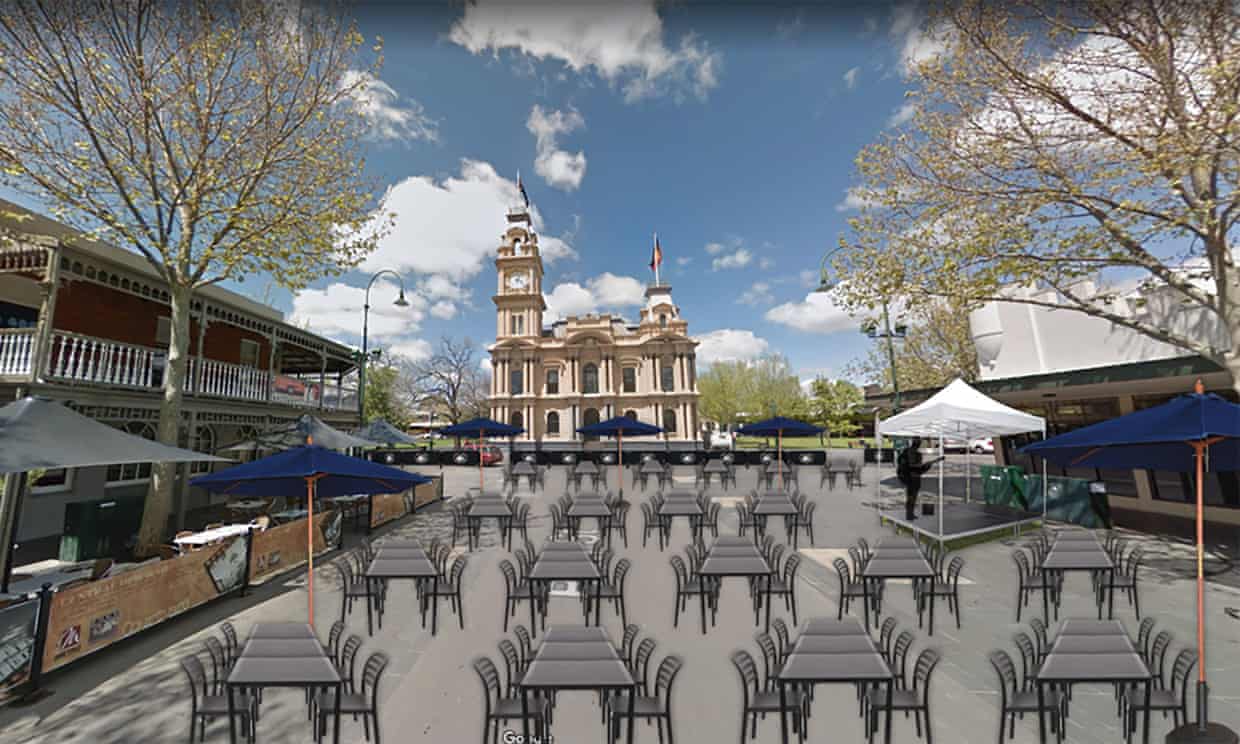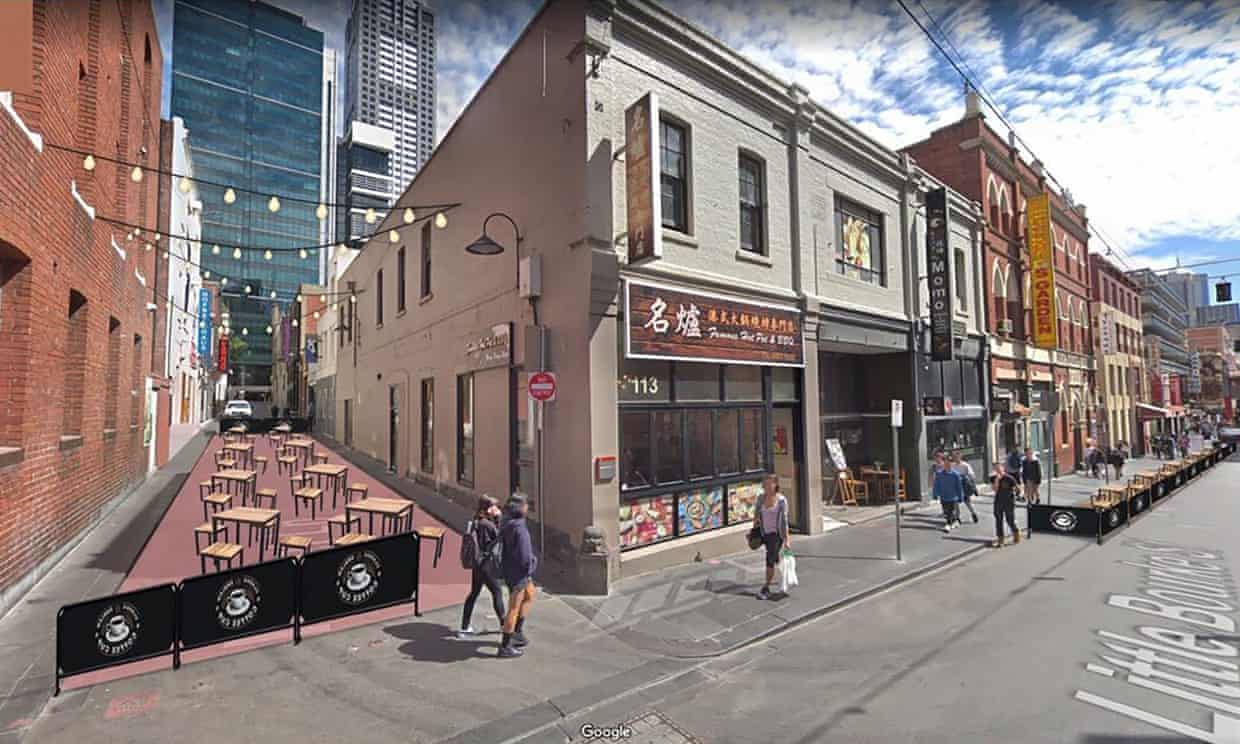
Victoria
Daniel Andrews plans outdoor dining to speed up Melbourne recovery
Victorian premier says alfresco seating on footpaths and in parks may be so popular it happens every summer
by Matilda Boseley- Covid Australia liveblog
- Free Guardian app for important news notifications
- Coronavirus Australia maps and cases
Victoria will transform city and suburban streets into “pop-up” cafes and restaurants to speed up the hospitality industry’s recovery, as the state announces an additional $190m of support to sole traders.
The state recorded its lowest number of Covid cases since June, with only 35 new infections. Seven people died in the past 24 hours, including a man in his 70s, a man and a woman in their 80s, and four people in their 90s.
In the lead-up to summer the premier, Daniel Andrews, said Melbourne’s footpaths, car parks and public parks would be given over for outdoor seating as part of a $100m investment into the CBD.
“What we know, if you look at places like New York, where they have been able to get their hospitality sector back to something approaching normal faster than what would otherwise have been the case because they have used … public space and turned it into pop-up cafes, restaurants, bars. That is what we will do. We will change the way the city operates and the suburbs and regional cities,” he said.
The changes will allow venues to seat more people while still complying with Covid-safe restrictions.
“I think these changes will be so popular that they ought to be a feature of every summer … there will be a significant return on that investment, not just in the months ahead but in the years ahead,” Andrews said.
Of the $100m support package for the Melbourne CBD, $30m will be available for small and medium-sized businesses to purchase outdoor dining equipment, with a maximum of $5,000 per business. Another $30m will support Covid-safe cultural events to attract Melburnians back to the CBD, and another $40m will go towards physical upgrades such as widening footpaths.

Other local government areas will be encouraged to do the same, transforming suburban shopping strips to allow alfresco seating. Hospitality businesses outside the CBD will receive a $87.5m outdoor dining support package, $58m of which can go to purchasing outdoor equipment.
“Those grants will be available to both licensed and unlicensed businesses, restaurants, takeaway food businesses, pubs, bars, clubs with a payroll under $3m, and we estimate about 11,000 businesses outside the CBD will benefit from that,” he said.
The announcements come after a backlash from the business community to the premier’s roadmap, which the Victorian Chamber of Commerce and Industry slammed as a “kick in the guts” that would see more businesses fold.
It also comes on the heels of a PwC report released last week indicating Melbourne CBD’s economy could lose $110bn over the next five years due to the Covid-19 crisis and the state government’s hardline approach to restrictions.
The premier has admitted the outdoor dining plan will require the closure of some roads and parking areas during the summer, and suggested adjacent restaurants share outdoor dining facilities and the costs of purchasing new equipment.
Victoria’s jobs and precincts minister, Martine Pakula, said the state government was seeking to expedite changes to the outdoor liquor licensing rules in order to allow the “alfresco summer” to go ahead smoothly, adding that the grants will help retain hundreds of thousands of jobs.
“It will support something like 16,500 businesses which are registered in the City of Melbourne. Those businesses support north of 470,000 jobs. A lot of those businesses have been enormously impacted by the restrictions which have been required to combat this global pandemic,” Pakula said.
The state government also announced an additional $190m to support sole traders.
Sole traders, who will be forced to remain closed until at least the second step of the roadmap on 28 September, will be able to access grants of up to $3,000.
“We think that will support around 33,000 sole traders across the state. That will be those traders who work in areas like accommodation and tourism, some non-permitted retail, media and film production, gyms, creative studios, outdoor entertainment, private museums and galleries,” Pakula said.
The state government had received criticism in recent days for the lack of support for sole traders.
Regional Victoria has continued to outstrip Melbourne in its recovery efforts, with the premier flagging a possible move to the “third step” of the roadmap in a few days.
“The metro 14-day rolling average to 11 September is 54.4 cases. In regional Victoria, it has dipped below 4 and it is now 3.9 … It means they are on the cusp of taking the next step,” Andrews said.
The third step would see “stay-at-home” orders removed, gatherings of up to 10 people outdoors permitted, and a maximum of five visitors from one other household allowed in private homes.
Andrews warned, however, that Victoria police would “make sure that the border between Melbourne and regional Victoria is as hard as it can possibly be”.